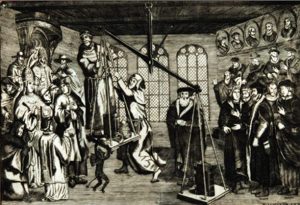
In the 16th century, a reform of the Catholic church appeared to be essential.
But how should it be reformed? To what extent?
The theological debates led to several forms of Reformation:
Important differences appeared with regard to the relationship with God, salvation and the forgiveness of sins and the way of understanding and interpreting the Bible.
The kingdom of France remained mostly Catholic. However the reformed strand spread despite the persecutions: reformed churches were established as from 1555. Inspired by Calvin, they adopted a confession of faith and a discipline which laid down the rules of their organisation at local, provincial and national level.
Church worship used the liturgy of Calvin, and the centre of worship was the sermon delivered by the pastor. Holy Communion was only celebrated four times a year, with the distribution of bread and wine. Services were also held in family homes.
Being Protestant in the 16th century meant being different in several ways: firstly in your relationship to God, without the intermediary of saints and the clergy, but also in your private life.